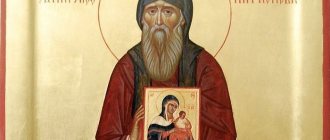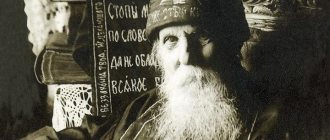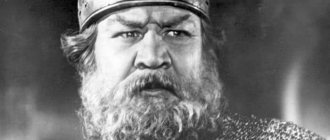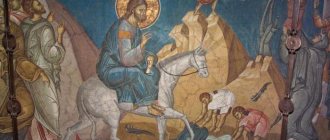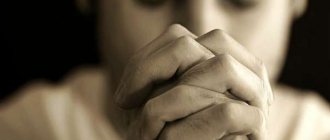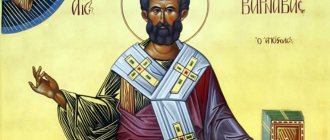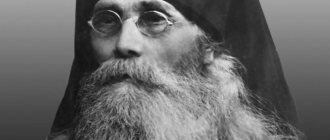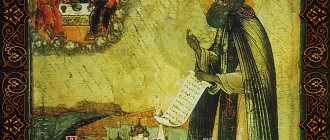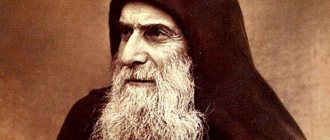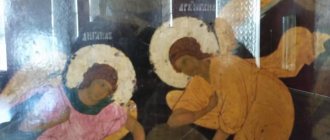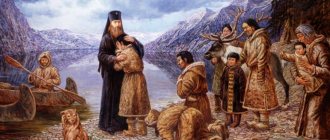Life of St. Ilya Muromets
The Russian knight Ilya of Muromets and the monk Ilya of the Kiev Pechersk Lavra are revered in the folk epic as one and the same person. A medical examination in the late 80s confirmed the similarity of the remains resting in the caves of the monastery with the description of the warrior of the Prince of Kyiv Vladimir Monomakh. The coincidence concerns the approximate age (40-45), height (1.77 meters), previous spinal disease, fatal signs (mark of a wound in the thoracic region).
Ilya was of a peasant family. His village is located 2 kilometers from Murom. Until the age of 30, he could not stand on his feet, until a miracle happened and he became healthy. Having received his father's blessing, Ilya went to Kyiv and became the head of the Kyiv squad.
Possessing remarkable strength, he did not know defeat in battles. In one of the battles with the Polovtsians, the hero was seriously wounded. Feeling that his strength was leaving him, the hero replaced the iron sword with a spiritual sword. In those days, this was a common thing for warriors who, due to age or injury, had lost the ability to be vigilantes.
Ilya Muromets accepted monastic service in the Kiev-Pechersk Dormition Monastery when Polycarp of Pechersk was the rector. Ilya died in 1188, at the age of 45. Initially, he was buried in the St. Sophia Cathedral, and then reburied next to the holy saints in the cave of the Kiev Pechersk Lavra.
The first to sing about the Murom miracle worker in his epic was Boyan, a singer-storyteller of the late 16th century. Russian legends give a detailed biography of Ilya Muromets. From birth until the age of 30, he was chained to a bench, but did not grumble against the Lord, but only lamented that he could not protect the Russian land from the invasion of enemies.
Popular rumor attributes the miraculous healing of a peasant son to the appearance of three kaliki (passers-by) to him. In the person of the strangers, Jesus Christ appeared to Elijah with two angels. Passers-by asked for a drink, and having been refused, they again repeated the request, which the patient was able to fulfill and be healed.
Thanks to the Lord, Elijah not only stood on his feet, but also felt great strength in himself, which, according to the instructions of the miracle workers, he had to spend on good deeds. Having received his father's blessing and the wish not to kill anyone out of malice, he went to Kyiv to become a princely warrior. The words of the epic contain a deep meaning that determined his life path: defense of faith, homeland, and the weak.
The descriptions of the victories of the epic defender serve as confirmation:
- near Chernigov (over the Tatar army);
- on the road to Kyiv (over the Nightingale the Robber);
- over the Pogany Idol (Pogans).
Ilya Muromets is the personification of a faithful and powerful servant of the fatherland. He does not know the uncertainty and tossing of Dobrynya Nikitich and Alyosha Popovich. Kind, balanced, straightforward, pious, protector of the weak, especially widows and orphans - this is how the Russian hero has been preserved in people's memory for centuries.
The hero was a deeply religious man. Nothing is known about his monastic exploits. He apparently possessed enormous spiritual power, as evidenced by his incorruptible relics.
Epic biography
Georgy Yudin. Illustration for the epic “The Illness and Healing of Ilya Muromets.” Year unknown
Mikhail Shemarov. Ilya Muromets and the Kaliki passers-by. Illustration for a collection of epics about Ilya Muromets retold by Vasily Starostin. Publishing house "Soviet Russia". 1967
Georgy Yudin. Illustration for the epic “Ilya Muromets and the Nightingale the Robber.” Year unknown
In the epics, a series of heroic events awaited Ilya after his 30th birthday, and before that time he suffered: he “could not control” either his arms or his legs. There is a hypothesis that this was a rare hormonal disease, which also provoked the physical dimensions of the hero. One day, as usual, he was sitting at home on the stove when strangers knocked on his gate and asked him to let them in. Ilya got up, opened the doors - and only then realized that he was healed. From that moment on, a life full of trials began: a meeting with the most ancient Russian hero - the giant Svyatogor, a trip to the “immovable stone” for weapons and armor, and feats for the good of his native land.
Even European legends mention Muromets. For example, in the German epic poems of the 13th century he is represented as the knight Ilya the Russian - a princely family and unprecedented power. Ilian von Riuzen helps the ruler of Garda get a bride and yearns for his homeland, for his wife and children who remained in Rus'.
Description of the icon
On the icon, Ilya Muromets is depicted in monastic or military attire. The difference between the icons also lies in the age of the saint depicted on the icon. A holy monk is an old man with a gray/gray-haired small but thick beard. On his head is a monastic headdress, and on his shoulders is a cape. In his right hand he holds a cross or a scroll, and with his left hand he blesses.
Ilya Muromets warrior is a young man dressed in armor, a helmet, and with a spear in his right hand. Above his head is a banner with the image of Jesus Christ with two warrior angels on his sides. There is a shield behind the back.
The biography of the saint is displayed at the bottom of the icon:
- father is a peasant;
- princely army;
- battle with the Polovtsy;
- monk against the backdrop of the monastery.
The inscription in Old Church Slavonic reads: “Reverend Ilya of Muromets.”
The fight for the principality
In the period from 1157 to 1169, the city of Kyiv became a hot place for civil strife for the title of Prince of Rus'. Just think, during this time the rule of Mother Russia changed hands about 8 times! And in 1169, Rus' was devastated by Andrei Bogolyubsky, who, by the way, took away from the territory of Rus' the consecrated face of Ilya Muromets, considered the greatest icon and bearing divine power and strength. This miraculous icon is still known to this day as the icon of the Vladimir Mother of God. From 1169 to 1181, as many as 18 princes ruled Kyiv, some of whom ascended the throne more than once. Also, the Polovtsians (Kipchaks, Cumans) entered the struggle for reign, who in the period from 1173 to 1190 intensively plundered the state treasury and even committed murders.
Relics in the Kiev Pechersk Lavra
The first description of the saint’s tomb was compiled at the end of the 16th century by Erich Lassot, an envoy of the Roman emperor to the prince of Kyiv. A chapel was allocated for him in the St. Sophia Cathedral. But by this time the remains had already been reburied in the Anthony Caves of the Kiev Pechersk Monastery.
A description of the relics made more than 300 years ago by the pilgrim Lukyanov has been preserved. It was a well-preserved mummy, tall (for that time) and strong built. She was missing both feet. A mark from a through blow with a spear is visible on the left hand. There is a gaping wound on the left side of the chest. The relics are dressed in monastic attire. Above the headboard is an icon of St. Elijah of Murom. In 1643, Ilya Muromets was canonized among the 69 saints of the Kiev Pechersk Lavra.
An epic hero or a real historical figure?
Ilya Muromets is the most famous, but at the same time the most mysterious hero of the Russian epic. It is difficult to find a person in Russia who has never heard of this glorious hero from the ancient city of Murom. Most know about him only what they remember from childhood from epics and fairy tales, and are often amazed at the complexity and ambiguity of this image. Scientists of various specialties have been struggling to resolve the mysteries associated with it for almost two centuries, but mysteries still remain. Our ancestors of the 16th - early 19th centuries. There was no doubt that Ilya Muromets was a real historical figure, a warrior who served the Kyiv prince. The usual beginning of epic tales, where Ilya leaves “Whether from that city from Murom, from that village from Karacharovo,” would seem to leave no room for doubt that he comes from the ancient Russian city of Murom, where not far from him there still exists the ancient village of Karacharovo. But doubts about the origin of the epic hero arose both in the last century and in our time. They are trying to connect the famous hero with the Chernigov region, where there are the cities of Moroviysk and Karachev, and where there are also legends about Ilya Muromets. But if you look at an ordinary geographical map, you can see that these two cities are separated by hundreds of kilometers and talking about the “Morovian city of Karachev” is absurd. Meanwhile, one cannot help but notice that Murom, Karachev, Chernigov, Moroviysk and Kyiv lie on the same line. This is precisely the same “straight path” that the hero used to travel from his native Murom to Kyiv “through those forests, Brynskie, across the Smorodinnaya River,” through the village of Nine Oaks, not far from Karachev. That is, there is no contradiction between classical epics and Karachev legends. It is also worth noting that the ancient city of Murom was part of the Chernigov principality for quite a long time. The association of the name of the epic hero with the city of Murom is fully consistent with both epic and historical reality. Murom and the Murom principality were quite significant both during the times of Kyiv, Vladimir-Suzdal, and Muscovite Rus', to become the birthplace of Ilya Muromets. Meanwhile, Russian chronicles do not mention his name. But he is the main character not only of our epics, but also of German epic poems of the 13th century, based on earlier legends. In them he is represented as a powerful knight, the princely family Ilya the Russian. In a documentary source, the name of this famous hero was first mentioned in 1574. The envoy of the Roman Emperor Erich Lassota, who visited Kyiv in 1594, left a description of the tomb of Ilya Muromets, located in the heroic chapel of the St. Sophia Cathedral. The mystery of the death of Ilya Muromets. There can be only one explanation for this fact: the name of the commoner was an eyesore for the noble boyars and the princes of the golden age of Kievan Rus who relied on them. That is why it was erased from the chronicles as an undesirable and even outrageous precedent of the dizzying rise of a simple peasant. Moreover, he was buried in the aisle of the main temple of Kievan Rus - Sophia of Kyiv - the grand-ducal tomb (where not all princes were buried). The boyars could not even dream of burial in Sofia of Kyiv, since for them it was an unheard-of honor! Probably for this reason, at a later time, the tomb of the “peasant boyar” was destroyed, while the tomb of his fellow chapel member, the son of the Drevlyan prince Mal, Dobrynya Nikitich, “survived.” This significant “memory” on the part of those in power regarding the unborn defender of the Russian Land was reported in his diaries by the ambassador of the Holy Roman Emperor Rudolf II, Erich Lasota, who was passing through Kiev from May 7 to 9, 1594, on his way to the Cossacks on a diplomatic mission. By that time, the Kiev Pechersk Lavra had taken care of the remains of the legendary man, where he rests to this day, in the Near Caves, under a modest inscription above the tomb “Ilya of Murom.” According to the church calendar, the memorial day of Ilya Muromets, the son of Ivanovich, is December 19 according to the old style, or January 1 according to the new style. By the way, it was on January 1, 1993, in the homeland of Ilya Ivanovich, in the village of Karacharovo, that the icon of the Venerable Ilya of Muromets was solemnly installed (with a reliquary inserted into it containing a particle of the relics of the hero, transferred at one time by the Kiev-Pechersk Lavra) in the newly built church of Guria, Samon and Aviva. And it is thanks to the archival materials of the Kiev Pechersk Lavra that we at least approximately know the dates of the life of the popularly beloved warrior. In 1638, the Lavra’s printing house published the book “Teraturgima” by the monk of the Kiev Pechersk Monastery Afanasy Kalnofoysky. The author, describing the lives of the Lavra saints, devotes several lines to Ilya, specifying that the hero lived 450 years before the book was written, that is, in 1188.
Canons and Akathists
Kontakion 1
To the commander of the forces of the Russian land, the warrior of the King Christ and the intercessor of Holy Rus', glorious in battle and invincible in battle, to the wondrous hero Elijah of Murom, let us sing a song of praise, may he now intercede for us who call: Rejoice, reverend Father Elijah, glorious intercessor of the Russian land.
Ikos 1
The Creator of Angels, when He descended to the earth in the form of a slave, did not reveal Himself to the world until the age of thirty, so you too, Saint Elijah, were granted until that age to be unknown to anyone and bodily immovable, and after that serve the Lord and His people with all zeal and zeal. , which we praise: Rejoice, thou wisely preserved for thirty years by the providence of God; Rejoice, chosen from birth, may the works of the Lord appear on you. Rejoice, having escaped many temptations of youth through your illness; Rejoice, you who kept your soul pure through suffering. Rejoice, you who have prepared these for the reception of grace; Rejoice, sickness, as a gift of God, endured with humility, Rejoice, reverend Father Elijah, glorious intercessor of the Russian land.
Kontakion 2
Saint Elijah suddenly saw three wandering men appear to him, asking him to drink water, answering them: I would have given you something to drink, but not the imam of my nagama, and fed you also, but my hands are not the imam of the possession, and the same elders commanded him to wear three on his nose and serve them, then Elijah jumped on his nose and cried out to God: Alleluia.
Ikos 2
Having understood that Elijah had suddenly been healed of his illness, first put the cross on himself as written, then gave the strangers something to drink, they also gave him a cup of honey to drink, asking him to drink it to the bottom, I obeyed the same, do this, we, sinners, we call in wonder: Rejoice, for in the form of three strangers the Lord has come to visit you; Rejoice, for the Holy Trinity has appeared to you. Rejoice, you who were healed by the word of the Lord; Rejoice, raised up from your bed by the will of God. Rejoice, having drunk the cup from the hand of the Savior; Rejoice, filled with the grace of Christ. Rejoice, Reverend Father Elijah, glorious intercessor of the Russian land.
Kontakion 3
Sensing the great power within himself, Elijah, having drunk the miraculous cup, as if he had removed the relics of the mountains and plucked up oak trees from the ground, spoke about this to a stranger asking about the manifestation of your power, and in joy he sang to the Savior: Alleluia.
Ikos 3
If you now have a heroic strength, then live. Elijah, may you be a warrior, and in battles your death will not be written down, - the pilgrim’s remark and, having blessed you, disappeared as if he had appeared, but we, having recognized the hand of the Lord on you, sing: Rejoice, you who have accepted the footsteps of walking, may you go to right paths; Rejoice, you who have received the possession of your hand, may you do works pleasing to God. Rejoice, you have received good health, may you labor for God by the sweat of your brow; Rejoice, you who have received healing, may you work for Him who healed you. Rejoice, you who have received the blessing, may you guard your soul in piety; Rejoice, you who have received great power, and glorify with it the name of the Almighty. Rejoice, Reverend Father Elijah, glorious intercessor of the Russian land.
Kontakion 4
Your parents were overcome with a storm of bewilderment and greatly amazed with great horror, seeing you come, and your feet and hands were healed, and cried out joyfully: Glory, glory to the Lord, praise to the Most High: Alleluia.
Ikos 4
Hearing the blessing of the Lord, you cannot stay at home any longer, since the time has come for your feat, ask your father - mother for permission to go to a distant land, the father says: I will give you a blessing for good deeds, but for bad deeds there are no blessings for you, you bow to the ground, having set out on the path that we sing: Rejoice, having fulfilled the words of Christ with your life; Rejoice, beloved of God and neighbors more than father and mother. Rejoice, you who preferred the love of God to the love of parenthood; Rejoice, you who left your father’s house and serve the entire Fatherland. Rejoice, hero of Holy Russia, restored by the spirit of Christ; Rejoice, you have been appointed guardian of the church and Rus' by Him. Rejoice, Reverend Father Elijah, glorious intercessor of the Russian land.
Kontakion 5
God-filled was your journey to the city of Kyiv. As if you first wanted to pray to the Lord in the churches of God and worship the Mother of God of the Pechers in the Lavra of Successes, thank you for the healing and sing his praise with the song: Alleluia.
Ikos 5
Seeing the great sorrow that befell the land of Kiev from the presence of the filthy, you laid the beginning with your feat, the city of Chernigov and the path to the city of Kiev, freeing and destroying the enemies of the Christian faith, so that the people, freed by you, cry out: Rejoice, shield of salvation, which is the word of God, having received; Rejoice, you who penetrated the copy of faith of the wicked. Rejoice, having overcome the infidels with the club of piety; Rejoice, having saved us from the arrows of the enemy with the cloak of chastity. Rejoice, having dressed yourself in the armor of virtues; Rejoice, thou who fought against the spiritual enemy fully armed. Rejoice, Reverend Father Elijah, glorious intercessor of the Russian land.
Kontakion 6
The preacher of the power of the Christian God appeared, Elijah, to the foreign armies with all the power to overcome because Jesus strengthened you, but Christians, who were freed by you, never cease to call: Alleluia.
Ikos 6
Then a shining star appeared in the city of Kiev - the bright brave hero Ilya of Muromets, to intimidate the wicked, the hard-hearted to trample, the Russian land given by God for glorification, where your relatives still call you: Rejoice, Russian army leader; Rejoice, guardian of orphans and widows. Rejoice, faithful help to the capital prince; Rejoice, hail and weight of the reliable mediastinum. Rejoice, grace-filled victory over the forces of the enemy: Rejoice, exaltation of the Orthodox people. Rejoice, Reverend Father Elijah, glorious intercessor of the Russian land.
Kontakion 7
Wanting with all your soul and heart to serve God and Holy Rus', you rejected the vainglorious thought, when you were trying to be appointed governor of the city of Chernigov, you humbly entered into the service of the prince of Kiev, and not just for one city, but to serve the whole people, as if it were not forbidden sing to God: Alleluia.
Ikos 7
Having appeared on earth as a new Sampson, having served the new Israel - the Russian Orthodox Fatherland with faith and righteousness, Elijah of ever-memorable comrade and now with your relatives, calling: Rejoice, as David fought in the name of the Lord of hosts; Rejoice, for as Galiath is the same, so you too have defeated the foreign giant. Rejoice, as Sampson, endowed with great strength from God; Rejoice, the namesake prophet Elijah through zeal for God. Rejoice, for Daniel blocked the gaping lions of unfaithful foreigners; Rejoice, Angel, former guardian of the borders of the Russian principality. Rejoice, Reverend Father Elijah, glorious intercessor of the Russian land.
Kontakion 8
Wandering along the side of Kiev and protecting it from dashing robbers, you did not seek wealth and honor for yourself, but I am going to serve for the Christian faith, and for the Russian land, and for the capital Kiev - the city, - you answered as a man, I do not seek glory from them , Singing glory to God: Alleluia.
Ikos 8
Trying to fulfill the entire law of the Gospel on yourself, laying down your soul every hour for your neighbor, thinking that the Lord is my helper and I will look at my enemies, you defended the borders of the Fatherland, but the Russian people do not stop calling you like this: Rejoice, call the Lord with all your heart hearing; Rejoice, you are not merciful for your neighbors. Rejoice, thou who conquered the infidels by right faith; Rejoice, you who drove out foreigners with the Russian spirit. Rejoice, you who called upon the Lord for help on the battlefield; Rejoice, having cut through the darkness of the enemy together with the Heavenly forces. Rejoice, Reverend Father Elijah, glorious intercessor of the Russian land.
Kontakion 9
Every nature of men and angels was greatly amazed, when you betrayed your only son, who betrayed the Russian Fatherland, without giving mercy, you slain with a spear, so that you do not harm the Orthodox people, but we, trembling with the strength of your faith and your trust in God, sing: Alleluia.
Ikos 9
Veti praised your exploits with many words, but whoever is able to express all the providence of God over you, for in your name all the power and strength of the spirit of the Russian hero has been embodied, you have crushed all the obstacles of the enemy, for which your descendants still magnify you: Rejoice, brave warrior of the militant Church; Rejoice, glorified victor in the triumphant Church. Rejoice, fearless and conqueror of all enemies, visible and invisible; Rejoice, beloved, beloved of the Lord and His people. Rejoice, righteous man, who did not hide the talent of his Master; Rejoice, reverend father, increasing the glory of our God. Rejoice, Reverend Father Elijah, glorious intercessor of the Russian land.
Kontakion 10
Although you saved your dear side not only from foreign enemies, but also from the unknown, you also saved your soul, the gold and silver given by princes, wasting it on the poor and using it to build churches, you retired to a monastic monastery, there from the depths of your heart singing to God: Alleluia ..
Ikos 10
The walls of the holy monastery sheltered you, Reverend Father Elijah, where in the cloister with unceasing tears and all-night prayers, for your sins and human blood, shed voluntarily and involuntarily, you propitiated God, who, seeing your humility and contrition, soon bestowed great grace upon you , as if all the brethren were amazed, calling: Rejoice, you have been transformed from a physical warrior into a spiritual warrior; Rejoice, having put aside the physical sword and spear and armed yourself with the spiritual sword. Rejoice, you who left behind perishable weapons and cut off the enemy with unceasing prayer; Rejoice, and in spiritual battle the winner has appeared. Rejoice, thou who was vouchsafed the gift of clairvoyance before the end; Rejoice, you who have also received the grace of miracles. Rejoice, Reverend Father Elijah, glorious intercessor of the Russian land.
Kontakion 11
Accept the singing of meager words and pray for your poor relatives, and be an intercessor for us with God, and a deliverer on earth, as before, and do not stop, we pray, to pray to God for Rus' with the Holy Song: Alleluia.
Ikos 11
Lamp lit by the oil of grace, Father Elijah, illuminate us now, who vegetate in darkness and gloom, and be the commander of the Russian army, liberating the Fatherland from the full of wickedness and strengthening the soldiers in the army, and ask them for reason and piety from God, and let us call to you: Rejoice , serenely resting with all the righteous from time immemorial; Rejoice, you who peacefully departed to the Lady of life and death. Rejoice, having taken much boldness from Him; Rejoice, you who continually intercede for your fellow tribesmen. Rejoice, thou who has hitherto guarded the Russian land from the presence of the fierce ones; Rejoice, Reverend Father Elijah, glorious intercessor of the Russian land.
Kontakion 12
By grace, growing the Russian state, the Lord, at the beginning of this messenger of you, Elijah, his warrior, the new people - God's acquisition - the Russian people are invincible from the slander of Satan, as the Orthodox are accustomed to, trusting in God, to sing: Alleluia.
Ikos 12
Singing the deeds of your life, we give praise to the Almighty God, the Wise One who organizes the world, for He Himself is Triune, so also Rus' was made Triune, and the Orthodox people, with this in mind, chose three heroes as their guardians, as they represent the Trinity of God, and their commander, With glorifying faith they cry out to Elijah of Murom: Rejoice, thou who appeared to the servant of the Trinity in life and after thy repose; Rejoice, for the three fingers of your hand, formed for the sign of the cross, remain so to this day. Rejoice, for through this unprecedented miracle, many who doubted have found the right faith; Rejoice, and do not cease to perform miracles according to your imagination. Rejoice, even after your death, in your death body, glorifying the Lord; Rejoice, you who have hitherto rested in the incorruption of your relics. Rejoice, Reverend Father Elijah, glorious intercessor of the Russian land.
Kontakion 13
O holy Father Elijah, warrior and monk, spiritual and physical hero, warrior against enemies visible and invisible, now defend our Fatherland - Holy Rus', which is the footstool of the Throne of the Lord, and protect the Russian Orthodox Church, may people sing to your memory, and to the Lord, to the one who has given Rus' a protector, they bring praise with the song: Alleluia, Alleluia, Alleluia.
(This kontakion is read three times, then ikos 1 and kontakion 1)
In paintings by Russian artists
Victor Vasnetsov. Bogatyrs. 1881-1898. Tretyakov Gallery
Nicholas Roerich. Ilya Muromets. 1910. Timing
Victor Vasnetsov. Knight at a crossroads. 1882. Timing
Ilya Muromets has been depicted more than once by both artists and illustrators: Nicholas Roerich and Vasily Vereshchagin, Konstantin Vasiliev and Nikolai Kochergin. The main thing in all images is the remarkable strength of the Russian hero. Viktor Vasnetsov most often turned to the epic plot.
Ilya in the painting “Bogatyrs” is a collective image. While working on the canvas, the prototypes were either Ivan Petrov, a peasant from the Vladimir province, or an Abramtsevo blacksmith, or a cab driver, whom the artist accidentally met in Moscow and persuaded to pose.
Vasnetsov’s painting “The Knight at the Crossroads” appeared under the influence of the epic “Ilya Muromets and the Robbers”; the artist worked on the image for ten years and painted two canvases: in 1877 and in 1882. Initially, the hero was turned to face the viewer, in the final version we see only the slumped shoulders and lowered head of the hero, looking at the stone in thought. The artist himself emphasized that the text of the inscription was taken from epic poetry.
Prayer to the Holy Venerable Elijah of Muromets
O holy reverend Father Elijah! Holy intercessor of Rus', mighty warrior, spiritual and physical warrior who appeared to her, who faithfully served in his life for the good of the Russian people and the glorification of the Christian God, and after his repose did not leave his intercession for us, ask, holy, from the All-Merciful Lord for the Tsar of our Fatherland, peace and prosperity, the well-being of the church, deliverance for Orthodox people from the wicked, victory for Russian soldiers in battles and victory against enemies plotting evil for the Church and the Orthodox Fatherland, intercede for us all, and we also ask you, Holy One of God, to grant us reason from God, yes let us know our sins, and spiritual strength, let us repent of our sins, and bodily strength, so that we may be able to correct our lives and revive Holy Rus', and pass from it into the Kingdom of Heaven, and there, with you and all the saints, we will be honored to continually praise the glorified God in the Trinity Father and Son and Holy Spirit forever and ever. Amen.
Troparion, tone 3
Today the Russian land rejoices, glorifying its warrior and wonderworker Elijah of Muromets, as if he were in the triumphant Church, he joins with his relatives and the militant Church, against the enemies of visible and invisible Holy Rus', asking the Lord for help, so that the Russian people may without restraint glorify and honor Christ God.
Biography
Victor Vasnetsov. Bogatyrsky leap. 1914. House-museum of V.M. Vasnetsova
Konstantin Vasiliev. Ilya Muromets is in a quarrel with Prince Vladimir. 1974
Evgeny Shitikov. Ilya Muromets. Engraving. 1981
Historians still argue about who was the prototype of the epic hero. According to legend, he became the strongman Chobitko, who won many military victories. So, for example, one day he killed enemies with his boot for lack of a better weapon - for which he received the popular nickname “Chobotok”, that is, “Boot”.
After another serious wound, the hero took monastic vows at the Theodosius Monastery, becoming a monk, and was subsequently canonized. It is believed that Ilya died during the capture of Kyiv by Prince Rurik Rostislavich, when the Polovtsian troops defeated the Lavra.
In 1988, a special commission of the Ministry of Health carried out an examination of the saint’s relics. Researchers found out that the monk suffered from a spinal disease, and his body was covered with traces of numerous wounds. Death is believed to have occurred from a blow from a spear or sword to the chest, through the left arm covering it.
This is exactly how the rector of St. Basil's Cathedral, Father John Lukyanov, describes Muromets in 1701 - with one palm pierced and the other folded for the sign of the cross. In his “Journey to the Holy Land” he notes: “It is deeply symbolic that his left hand testifies to the service of a warrior, and his right hand to the feat of prayer.”
